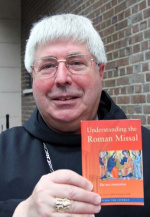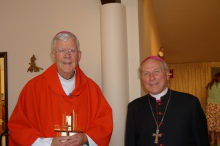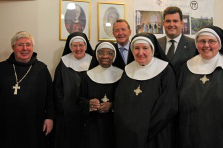Abbot Cuthbert Johnson discusses New Missal

Abbot Cuthbert Johnson
Abbot Cuthbert Johnson, OSB, reflected upon and shared his hopes for the new translation of the Roman Missal during an exclusive interview with Peter Jennings, in London, yesterday the eve of the Feast of SS Peter & Paul, Apostles.
Abbot Cuthbert, a Benedictine monk, is Chaplain to the community of Tyburn Convent. A distinguished liturgist, accomplished musician and writer, he worked in Rome at the Congregation for Divine Worship from 1983-96. Abbot Johnson is a Consultor to the Congregation and an Advisor to the Vox Clara Committee.
Pope Benedict XVI, speaking about the imminent publication of the new translation of the Roman Missal, during his address to the Bishops of England, Scotland and Wales, in the chapel of St Mary's College, Oscott, on Sunday 19 September 2010, said: "I encourage you now to seize the opportunity that the new translation offers for in-depth catechesis on the Eucharist and renewed devotion in the manner of its celebration."
Two contributions to this catechesis have been prepared by Abbot Cuthbert and published by the CTS. In the pamphlet 'Understanding the Roman Missal' Abbot Cuthbert presents and explains the new translation with a series of liturgical and spiritual reflections. With the leaflet 'The new translation of the Roman Missal' the Abbot provides a concise introduction to help understand the reasons for a new translation.
Archbishop Bernard Longley said: "I am very happy to commend Abbot Cuthbert Johnson’s CTS booklet on the new translation of the Mass. His direct style and useful insights will help us pray these new texts with deeper understanding. This little study helps equip us to see the beautiful scriptural images on which our liturgical prayers are based.”
The Archbishop of Birmingham added: "It will be a welcome tool in our parishes as we prepare to introduce the new translation this autumn.”
INTERVIEW
Peter Jennings: There is an old saying - if it's not broken don't fix it - so why the need for a new translation of the Roman Missal?
Abbot Cuthbert Johnson, OSB: Since the first printed edition of the Roman Missal appeared at the end of the fifteenth century there have been numerous editions. These editions were necessary to incorporate those liturgical texts composed on the occasion of the institution of new Feasts or the canonisation of Saints.
It is well known that Blessed Pope John Paul II added many Saints to the calendar and approved various liturgical texts. This gave rise to the need for another edition of the Roman Missal which was published in Latin during 2002. The new translation of the Missal is simply the English text of this Latin Missal promulgated by Blessed Pope John Paul II.
We are talking about a new missal but actually the phrase 'a new Missal” is slightly misleading. Some people are asking if this Missal will be ushering in a new era of liturgical changes.
The simple answer is that there are no changes in the Order of Mass. As regards the peoples’ responses there are about ninety changes and many of these are simply the introduction of words such as 'holy', 'spirit', and, for example, 'I' instead of 'we' in the Creed.
Peter Jennings: What do you say to older Catholics who loved the Latin and struggled with the Mass in English when it was first introduced and will find another change extremely difficult?
Abbot Cuthbert Johnson: Anyone under the age of 55 can hardly remember the Mass before the first changes were introduced on 7 March 1965. It was then that the prayers at the foot of the altar were omitted and a degree of English was introduced.
The Fathers of the Second Vatican Council (1962-65) voted almost unanimously for liturgical renewal. They may not have foreseen some of the developments that occurred and may not have liked them. Nevertheless they were agreed that changes were necessary. It can be argued that liturgical change itself is not in principle a problem.
Peter Jennings: In what particular ways does the new translation differ from the English Missal introduced by Pope Paul VI in 1973?
Abbot Cuthbert Johnson: The 1973 translation was undertaken with some considerable haste in response to pressing demands from some of the English speaking Bishops’ Conferences throughout the world. It was soon recognised that it had certain limitations but it would unfair to be over critical of this text which has served the Church well for more than thirty years.
The Liturgical prayers have their own ancient character and structure and this has been preserved by translating them as exactly as possible. The text in this new edition has been designed to have not only dignity and beauty but also doctrinal precision in a style which is worthy for use in Divine Worship.
Peter Jennings: Which English-speaking countries are involved in the project; and have the Bishops' Conference in these countries all played a meaningful role in the work?
Abbot Cuthbert Johnson: All of the English speaking Conferences that are members of the International Commission on English in the Liturgy (ICEL), that is, Australia, Canada, England and Wales, India, Ireland, New Zealand, Pakistan, Philippines, Scotland, South Africa, and the United States of America, were involved through their representatives in the work of the preparation of the text.
All the bishops of the member Conferences received the text in segments as it became available. Many bishops shared this text with the members of their liturgical commission and others, thus providing for a wider degree of consultation.
Peter Jennings: Will there be several different versions of the translation for use where the English spoken is not exactly the same as in another country - for example, in the United States of American and England & Wales and Scotland?
Abbot Cuthbert Johnson: No, the only variations, apart from spelling, will be the introduction of those Feasts which belong to the proper Calendars of each country. Our recently beatified Blessed John Henry Newman will in due course be added to the calendar for Great Britain. Certain local customs approved by the Bishops’ Conferences will also be included.
Peter Jennings: What is the purpose of ICEL, (The International Commission on English in the Liturgy) and what was its role in the new translation?
Abbot Cuthbert Johnson: ICEL was founded in 1963 by the major conferences of bishops in whose territory English is spoken with the precise aim of undertaking the work of translating the texts of the Liturgy. It still continues in that important role.
Peter Jennings: What is the committee which is known 'Vox Clara'; and what was its role in the work?
Abbot Cuthbert Johnson: Several Bishops’ Conferences, not only of the English speaking world, had discussed with the Congregation for Divine Worship in Rome its process for examining liturgical texts. The Congregation was the first to recognise that its own resources in this particular matter were somewhat limited.
This lead to the decision by the Congregation to establish an Advisory Committee, for the main language groups - English, Spanish, French and German. The task of these Committees would be to examine the texts on behalf of the Congregation and submit any suggestions or recommendations.
The Vox Clara Committees are at the service of the Congregation and provide the assurance for the Bishops Conferences’ that all liturgical texts are examined with the meticulous care and expertise which is necessary for such important work.
Peter Jennings: What particular skills and gifts do you feel you have been able to contribute to this complex project?
Abbot Cuthbert Johnson: In 1987 in order to assist the work of ICEL, the then Secretary of the Congregation of Divine Worship, Archbishop, now Cardinal Virgilio Noe, encouraged me to prepare a study on the sources of the Prayers and Prefaces of the Roman Missal.
This was a task that I was unable to accomplish alone and so called upon the help of a good friend of mine, an English Marist Father, Father Anthony Ward, the present Undersecretary of the Congregation.
This was the beginning of a working partnership for the study of the sources of the Latin liturgy. To the present it has resulted in the publication of 15 volumes and numerous articles concerning the theological, biblical, historical and liturgical background and study of the Roman Liturgy. This includes not only the Mass but the
Sacraments and the Liturgy of the Hours.
My liturgical research has been mainly academic in character until the recent request by the CTS to collaborate in the preparation of catechetical and pastoral resources relating to the new translation.
Peter Jennings: Does the biblical character of the new translation differ from the former translation?
Abbot Cuthbert Johnson: The Fathers of the Church often spoke of the two sources from which the Christian community is nourished, the table of the Word and the table of the Eucharist. The new translation takes care to ensure that the Biblical resonances found in some of the prayers are heard and recognisable.
For example, the following biblical resonance in the third Eucharistic Prayer has been warmly welcomed: “from East to West ...” is now “from the rising of the sun to its setting.” This is a clear echo of the words given in the Book of the Prophet Malachi.
Peter Jennings: Is there much difference in the liturgical character of the new translation?
Abbot Cuthbert Johnson: Many scientific disciplines express their theories and ideas with the help of a specialised vocabulary. One such well known example is the language of the medical profession which is not necessarily the language of every day. So likewise theology and liturgy also have their own language and specialised vocabulary. Those words which may not be familiar, terms like consubstantial, will need explanation. This is the role of catechesis.
What is the purpose and background to your CTS booklet "Understanding the Roman Missal"?
Abbot Cuthbert Johnson: I hope that this CTS booklet will provide an easily accessible resource for understanding the Roman Missal. It attempts to answer questions about the Mass by drawing on the writings of the Saints, the Church Fathers, and the teaching of the Church.
Peter Jennings: Are you working on any other publications about the new translation; and if so, why in particular?
At the moment I am working on the text of another CTS booklet – “The Art of Celebration” – that will be published to accompany the publication of the English Missal later this year.
At the end of this interview do you have any particular points that you would like to make to priests, deacons, religious and lay-faithful in England and Wales about the new translation of the Roman Missal?
Perhaps we should remember Saint Benedict’s words that “We believe that God is present everywhere and especially is this so when we celebrate the Sacred Liturgy”.
My hope for the new English translation of the Roman Missal is that all controversy is now laid aside, and that together bishops, priests, deacons, religious and the lay- faithful work to ensure that it becomes a great source for renewal in the liturgical life of the Church, and makes a valuable contribution to the work of new evangelisation.

















